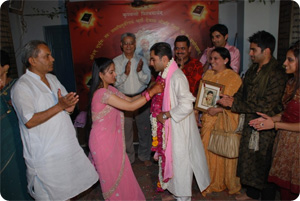Arya Samaj Wedding

In India, the wedding rituals and customs in any family are mainly based on the religion or community that the family follows. The community only decides the kind of wedding ceremony that a couple would have. There are many people in India who don't believe in these specific and staunch rituals or grand and elaborate celebrations of the Hindu wedding function. For them, who are not so particular about the rules and regulations of their religion and community or want to keep their marriage a low key affair, Arya Samaj Marriage is a very convenient wedding option for them.
An Arya Samaj wedding is conducted by the Arya Samaj, founded by Swami Dayanand Saraswathi in any of its temple. The marriage in Arya Samaj wedding is performed as per Vedic rites and thus does not require any flamboyance. In fact, simplicity is the main essence of Arya Samaj wedding. Though the Arya Samaj weding is meant only for Hindus, any non-Hindu can also be allowed to undergo the marriage rituals if he undergoes the process of conversion through Shuddhi i.e. Purification.
The Arya Samaj wedding ceremony is performed with the fire and other elements as the witnesses since they don't believe in idol worshipping. In an Arya Samaj wedding, the mantras, which are chanted, are translated into a language that the couple can understand so that the couple can relate themselves to the meaning and significance of the wedding mantras. This wedding is different from the traditional Hindu wedding in the sense that it does not involves elaborate rituals and the ceremony is not extended over a long period of time. The wedding ceremony lasts for an hour and the wedding expense is very low compared to the normal traditional Hindu wedding.
The main rituals of the wedding are as follows: - Madhuparka is a ritual in which the bride and the groom arrive at the venue of the wedding the groom partakes of 'Madhuparka', which is a mixture of honey, curds and cream. The bride gives the groom water three times, which he sprinkles on his feet, over his body and drinks it the third time. Similarly, the groom also follows the ritual. This ritual symbolizes the commencement of their journey into a happy married life.
- The ritual of kanyadaan is the one in which the parents of the bride offer their daughter's hand in marriage to the groom.
- Havanv is the ritual where the wedding is solemnized in front of the Agni or holy fire, which is considered life. The priest chants the mantras invoking blessing for happy married life.
- In the Pani Grahan Sanskar the groom takes the bride's hands in his and chants mantras promising to be beside her in times of need and look after all her needs. Then there are rituals like Shilarohan, Lajahom, Parikrama , and Saptapadi, which are followed.
- Lastly the ritual ends with the Aashirwaad ceremony where the newly wedded couple takes the blessing of all the elders in the family.
| |
Other Categories
Arya Samaj Wedding
Christian Wedding Ceremony
Hindu Marriage Act
Muslim Wedding Ceremony
Indian Wedding Facts
Kanyadaan
Marriage Legalities in India
Sikh Wedding Rituals
Parsi Wedding Ceremony
Special Marriage Act
Muslim Marriage Act
Marriages in Different Religions
Famous Indian Weddings
Seven Vows Of Marriage
Indian Baraat
Wedding Photography
Main Categories
Indian Weddings
Wedding Decoration Tips
Pre Wedding Functions
Post Wedding Functions
Hindu Marriages
Indian Wedding Day Functions
Muslim Wedding Ceremony
Malayalee Wedding Ceremony
Kannada Wedding Ceremony
Kashmiri Wedding Ceremony
Oriya Wedding Ceremony
Tamil Wedding Ceremony
Bengali Wedding Ceremony
Punjabi Wedding Ceremony
Jain Wedding Ceremony
Maithil Brahmin Wedding Ceremony
Sindhi Wedding Ceremony
Telugu Wedding Ceremony
Maharashtrian Wedding Ceremony
Assamese Wedding Ceremony
Jewish Wedding Ceremony
Marwari Wedding Ceremony
Buddhist Wedding Ceremony
Gujarati Wedding Ceremony
Planning Your Honeymoon
Indian Bride
Indian Groom
Indian Wedding Features
Marriage Problems
Indian Wedding Preparation
Indian Wedding Planners
Post Wedding Preparation
Main Day Function
|

